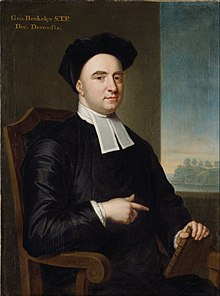George Berkeley
George Berkeley | |
|---|---|
 Portrait of Berkeley by John Smybert, 1727 | |
| Era | 18th century philosophy |
| Region | Western Philosophy |
| School | Idealism, Empiricism |
Main interests | Metaphysics, Epistemology, Language, Mathematics, Perception |
Notable ideas | Subjective Idealism, The Master Argument |
Influences | |
Influenced | |
| Signature | |
 | |
George Berkeley (12 March 1685 – 14 January 1753), or Bishop Berkeley,[1] was an Irish bishop and philosopher.
Berkeley was one of the three 'British Empiricists', philosophers around the late 1600s and 1700s who believed in 'empiricism', the philosophy that everything we learn comes through our senses. The other British Empiricists included the Englishman John Locke and Scotsman David Hume.
Philosophy
[change | change source]His philosophy was called "immaterialism", or "subjective idealism". His idealism said that all our ideas came through sensations, but our senses didn't tell us anything about the world.
He said that Locke's belief in matter was wrong. He said that even though we can see, hear, taste, touch and smell, there was no way of knowing that our senses were reacting to matter, because to find out how accurate our senses were, we would need to study the very thing we use to study. Instead, he said that our experiences are caused by God, a being that is also a mind, like us, and powerful enough to create all our ideas and senses.
Life
[change | change source]Berkeley was born at his family home, Dysart Castle, near Thomastown, County Kilkenny, Ireland. He was educated at Kilkenny College and attended Trinity College, Dublin, completing a Master's degree in 1707.
Bibliography
[change | change source]- Philosophical Commentaries (1707–08, notebooks)
- An Essay towards a New Theory of Vision (1709)
- A Treatise Concerning the Principles of Human Knowledge, Part I (1710)
- Three Dialogues between Hylas and Philonous (1713)
- De Motu (Berkeley's essay)|De Motu (1721)
- Alciphron: or the Minute Philosopher (1732)
- The Theory of Vision or Visual Language … Vindicated and Explained (1733)
- The Analyst (1734)
- The Querist (1735–37)
- Siris (1744)
Notes
[change | change source]Other websites
[change | change source]- A list of the published works by and about Berkeley as well as online links Archived 2016-05-18 at the Portuguese Web Archive
- A bibliography on George Berkeley
- More easily readable versions of Principles of Human Knowledge, Three Dialogues, and Alciphron
- An extensive compendium of online resources, including a gallery of Berkeley's images Archived 2006-01-07 at the Wayback Machine
